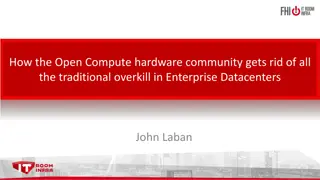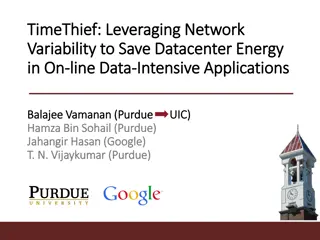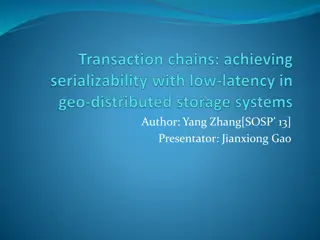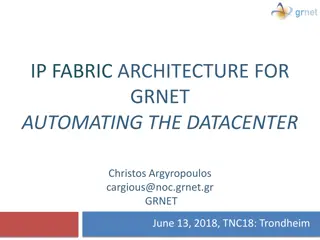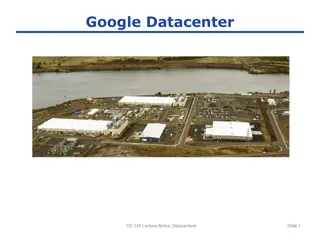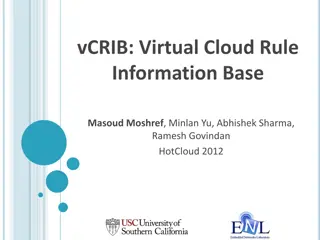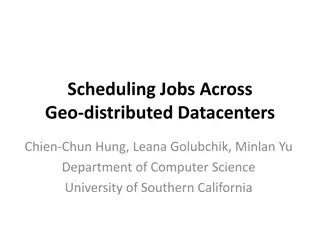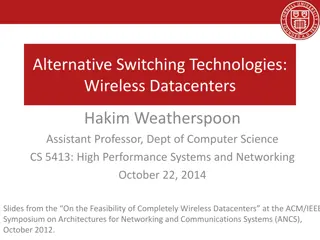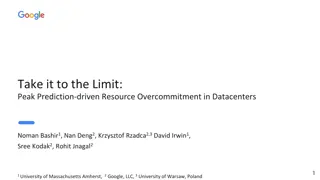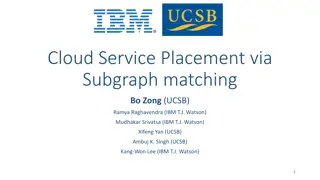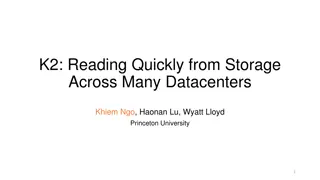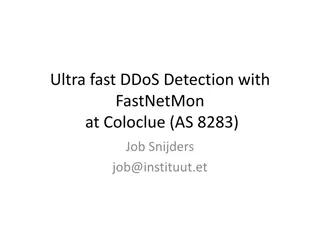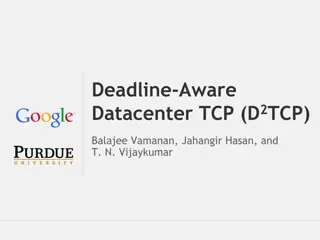Revolutionizing Enterprise Datacenters with Open Compute Hardware Community
The Open Compute Project Foundation, a non-profit open-source community, is disrupting the traditional data center industry by eliminating overkill in enterprise data centers through innovative hardware designs and collaborative contributions. OCP's technology principles focus on efficiency, scalabi
1 views • 25 slides
Energy Management Challenges in Datacenters for Online Data-Intensive Applications
Massive growth of big data calls for efficient energy management in datacenters hosting online data-intensive applications. Traditional energy management methods fall short due to the interactive nature of these applications and strict service-level agreements. Leveraging network variability, TimeTh
0 views • 23 slides
Distributed Database Management and Transactions Overview
Explore the world of distributed database management and transactions with a focus on topics such as geo-distributed nature, replication, isolation among transactions, transaction recovery, and low-latency maintenance. Understand concepts like serializability, hops, and sequence number vectors in ma
0 views • 17 slides
IP Fabric Architecture for GRNET Datacenters: Automating the Future
GRNET is expanding its data center infrastructure to address existing problems, balance tested and innovative solutions, and enable VLAN stretching between data centers. The new architecture aims to enhance network efficiency and scalability by implementing an IP Fabric solution. Previous architectu
0 views • 19 slides
Overview of Datacenter Operations and Failures
The content discusses datacenter organization, frequent failures, and the prevalence of datacenters in modern computing. It details the typical first-year failures in a new datacenter and highlights the number of servers per datacenter and the shift towards datacenter-centric computing.
0 views • 10 slides
Insights into Rule Implementation in Cloud Datacenters
Cloud datacenters utilize rules to manage policies such as access control, rate limiting, and traffic engineering. This study explores the placement of rules considering resource constraints, machine limitations, and competition for resources. It highlights the need for flexible rule placement and f
0 views • 25 slides
Job Scheduling Across Geo-distributed Datacenters
Scheduling jobs across geo-distributed datacenters poses challenges such as optimizing job completion time, reducing data transfer costs, and coordinating tasks across multiple locations. Various strategies like reordering-based approaches and scheduling heuristics are explored to enhance job schedu
0 views • 32 slides
Exploring Wireless Technologies for Datacenters
This presentation delves into the feasibility and advantages of completely wireless datacenters, focusing on alternative switching technologies, goals, conventional setups, opportunities, 60GHz wireless technology, antenna models, design challenges, and the motivation behind moving towards wireless
0 views • 28 slides
Resource Overcommitment in Datacenters: The Limit and Opportunity
Exploring resource overcommitment in datacenters, this study delves into the benefits of overcommitting resources beyond physical capacity to increase utilization and reduce costs. With a focus on peak prediction-driven strategies and setting the right level of overcommitment, the research highlight
0 views • 19 slides
Subgraph Matching for Cloud Service Placement in Datacenters
This research explores the efficient placement of cloud services in datacenters through subgraph matching, focusing on compatibility and resource optimization between customers and providers in cloud computing environments. The study highlights challenges in dynamic subgraph matching and the limitat
0 views • 29 slides
Efficient Datacenter Deployment Strategies for Low Latency
Explore the strategies for deploying services across multiple datacenters to reduce end-user latency. Topics include the impact of replication levels, benefits of partial replication, and achieving low latency with strong guarantees like causal consistency and read-only/write-only transactions.
0 views • 14 slides
Ultra-Fast DDoS Detection with FastNetMon at Coloclue
Discover how Coloclue, a non-profit ISP, leverages FastNetMon and automation to detect and mitigate DDoS attacks within seconds, automating the problem away and protecting their network effectively. With 2 datacenters, 4 routers, and a volunteer-driven approach, Coloclue successfully defended agains
0 views • 16 slides
Deadline-Aware Datacenter TCP: Challenges and Solutions
Datacenters hosting Online Data Intensive applications face unique challenges such as meeting tight deadlines and handling fan-in bursts. Existing approaches like DCTCP and D3 have shortcomings in handling these issues effectively. In this context, D2TCP emerges as a promising solution with deadline
0 views • 29 slides
